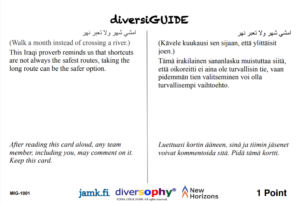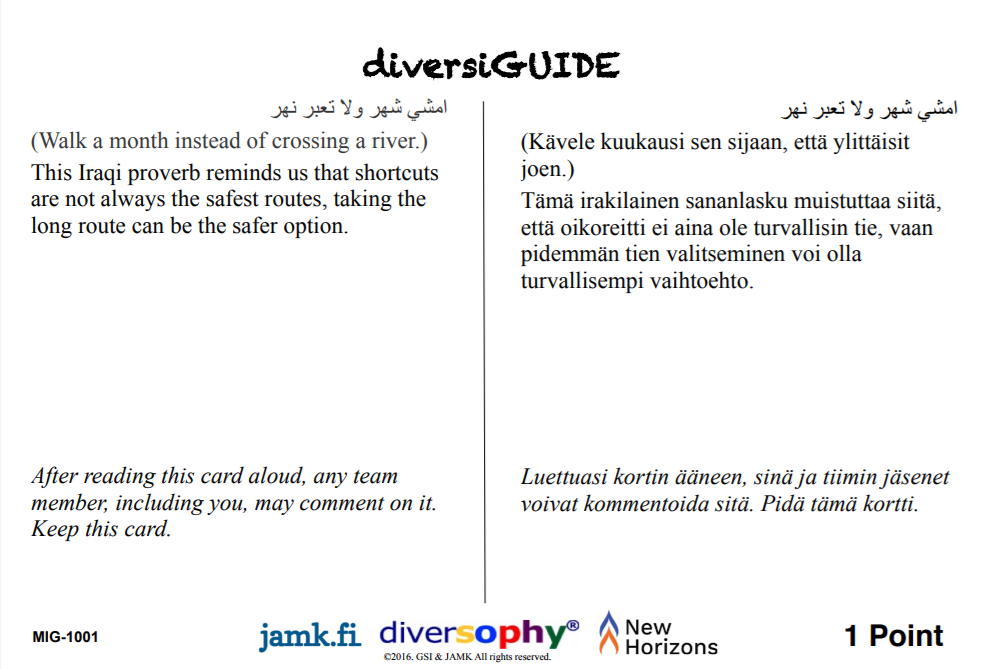
It is a cultural feature in Denmark that it is difficult to become part of the existing social networks. On the other hand, there is a great deal of goodwill from many Danes to help, especially refugees. The problem when you are a foreigner (including refugee) is that it is difficult to get in touch with ordinary Danes in addition to the contacts you have on a daily basis, which are usually formal contacts (employers when in work experience, meetings with the municipality and even the daily shopping in stores and supermarkets). Therefore, the purpose of the Diversophy Denmark project hosted at Højskolen på Kalø is to provide a concrete reason for Danes and refugees to meet through an established business training game adapted to this new purpose. In addition, the project will also work on new ways to finish the game, namely that the contacts created during the game can continue and deepen afterwards. The project is financed by the Danish Ministry for Integration and we are fortunate to be able to collaborate with Line Mark Rugholt, an experienced intercultural trainer, who is now a teacher.
The purpose of the project is to increase the social capital of both refugees and Danes by bringing together small mixed groups of Danes and established refugees from a specific rural town by means of a game. The groups meet in a social and relaxed event where knowledge is exchanged both about Denmark and the refugees’ homelands (primarily Syria and Eritrea) on an equal basis. The game is based on a well-proven business training game called Diversophy, created by George Simons, an American living in France. The first phase of the project will be the completion of the Danish version of the game (in Danish, English, Tigrinish and Arabic), which has until now been developed on a voluntary basis. This will be followed up by 3 or 4 local events where the game will be played and a guide written about how to facilitate the game for maximum effect in the rural context.
The adaptation of the game from business training games to integration games began in Finland in 2015. The Finnish version is mainly about refugees from Iraq, so the game has to be adapted to Denmark and refugees primarily from Syria and Eritrea.
The idea has been well-received so far by potential players on both the Danish and refugee side. It has also awakened the interest of newspaper reporters who are investigating whether money for such projects is well-spent. That is a little daunting but we are hoping that we do a good enough job so that the answer is yes. The idea will be to create a relaxed atmosphere with a bit of food from different cultures and to promote contacts that last beyond the game. The aim will be to promote an exchange of information about Danish and refugee cultures thereby laying the ground for longer lasting connections that may include coffee times, conversation and support with everyday life. I recently learned of a refugee family that had lived in the same village for over two years and had yet to meet anyone in the village. Life is so much easier when you have a support network that you can rely on and this is one of the problems that this project seeks to address.
Of course the most important thing for the refugees is to secure work that allows them to support themselves without public assistance. A project like this is unlikely to produce jobs, however we do hope that it will help to build the connections that so often lead to jobs over the longer term.
Last October we got the chance to try out a very small version of the game with participants of the University of Roskilde’s Imagine Europe seminar from we gained many useful ideas about how to approach our planned events in and around Højskolen på Kalø.
I talked to Laurent Borgmann about the project in Germany last November. See below.
